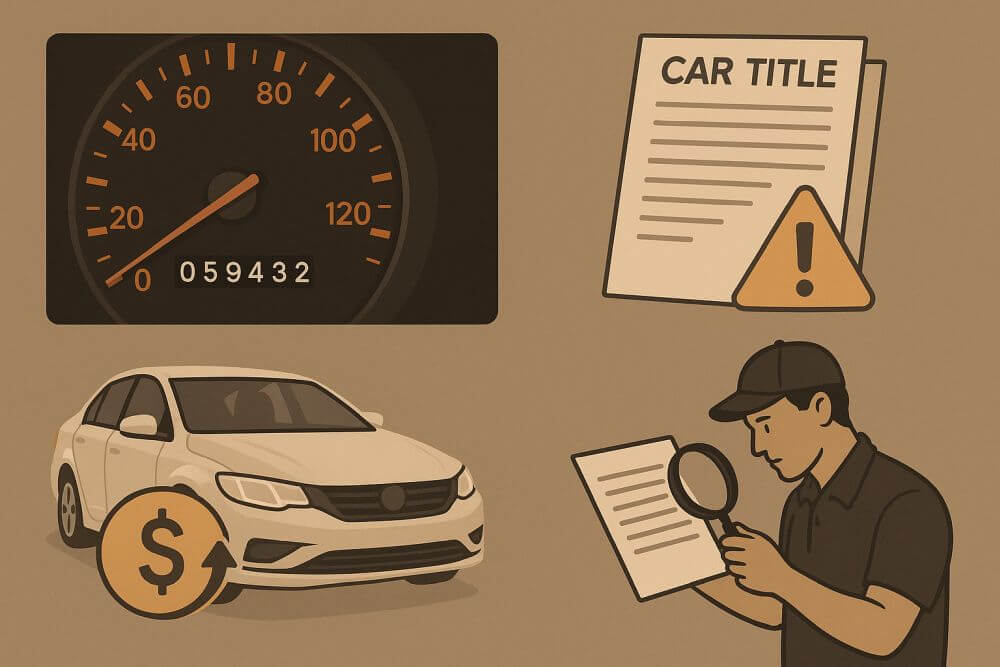When shopping for a used car, one of the most crucial factors buyers rely on is the mileage. A vehicle’s mileage helps indicate how much wear and tear it has undergone, which can directly impact its price, reliability, and future maintenance costs. But what happens when this crucial number is manipulated? This is where odometer fraud — also known as “clocking” — comes into play, creating serious risks for unsuspecting buyers.

What is Odometer Fraud?
Odometer fraud occurs when someone tampers with a vehicle’s odometer to display a lower mileage than the car has actually traveled. This deceitful practice is often done to make a car appear newer, more desirable, and worth more than its true market value.
While modern digital odometers are more difficult to alter than older mechanical ones, they are not immune. Advances in technology have unfortunately made it easier for dishonest sellers to roll back mileage with specialized tools.
How Odometer Fraud Impacts Title History
A car’s title history acts as its legal record, documenting important details like ownership changes, accident records, and mileage at various points (e.g., during registrations and inspections). When odometer fraud occurs, it can distort this record in the following ways:
- Inconsistent Mileage Records: Many states require mileage disclosure during title transfers. If a vehicle has been clocked, there may be sudden drops or unrealistic mileage jumps in its history reports.
- Branded Titles: If odometer fraud is discovered, a car’s title may receive a brand such as “Not Actual Mileage” or “TMU” (True Mileage Unknown). These brands serve as warnings to future buyers and significantly reduce the vehicle’s resale value.
- Legal Red Flags: Anomalies in title history can lead to further investigations, possible civil penalties for the seller, and legal challenges for the buyer.
Impact on Vehicle Value
Mileage is one of the primary factors influencing a vehicle’s market value. Lower mileage often means a higher price tag, as it suggests less wear and more life left in the car. When fraudulently reduced:
- Artificial Price Inflation: Sellers can charge thousands more than the car is truly worth. Buyers might unknowingly overpay for a vehicle with hidden mechanical wear and potential future issues.
- Decreased Long-Term Value: Once odometer fraud is discovered, the vehicle’s value plummets. Future resale becomes difficult, and the car may be permanently marked as a high-risk purchase.
- Insurance Complications: Incorrect mileage can affect insurance premiums and claims. For example, if an accident occurs and the actual mileage is uncovered, insurers may refuse to honor certain claims or adjust payout amounts.
Risks to Vehicle Safety and Maintenance
Beyond the financial consequences, odometer fraud can directly impact safety:
- Unexpected Repairs: Vehicles with higher true mileage are more prone to breakdowns. A buyer misled into thinking they bought a low-mileage car may face unexpected and costly repairs.
- Skipped Maintenance: Scheduled maintenance is often mileage-based. If maintenance records are manipulated alongside the odometer, crucial services like timing belt replacements or brake inspections may be missed, increasing the risk of accidents.
How to Protect Yourself from Odometer Fraud
Protecting yourself starts with diligence:
- Get a Vehicle History Report: Services like VinCheckPro’s free VIN check can reveal mileage records, title brands, and other red flags indicating odometer fraud.
- Inspect Maintenance Records: Compare service records with the displayed mileage. Look for inconsistencies or suspicious gaps.
- Check Wear Indicators: Excessive wear on the steering wheel, pedals, and driver’s seat can signal higher actual mileage than shown.
- Work with Trusted Sellers: Purchase from reputable dealers or private sellers with transparent documentation.
- Request an Independent Inspection: Have a trusted mechanic evaluate the vehicle for signs of tampering.
Frequently Asked Questions (FAQs)
How common is odometer fraud?
Odometer fraud is more common than many people think. The National Highway Traffic Safety Administration (NHTSA) estimates that over 450,000 vehicles are sold each year with false odometer readings in the U.S. alone. With advances in digital odometer tampering tools, it has become harder to detect without thorough checks.
Can a vehicle history report detect odometer fraud?
Yes — a vehicle history report can help identify odometer fraud by showing recorded mileages at different points in the car’s life, such as during title transfers, inspections, or maintenance. If there are mileage inconsistencies, that’s a strong sign of tampering.
What should I do if I suspect odometer fraud after purchase?
If you suspect that the vehicle you purchased has had its odometer rolled back, document all evidence, including service records and the vehicle history report. Report the issue to your state’s Department of Motor Vehicles (DMV) and consider seeking legal advice. You may also be able to pursue compensation under consumer protection laws.
Does odometer fraud affect car insurance?
Yes. Incorrect mileage can impact your insurance policy, including premium calculations and claims settlements. If an insurer discovers odometer fraud, they may adjust or deny claims, or even cancel your policy in severe cases.
Are there legal penalties for odometer fraud?
Absolutely. Odometer fraud is a federal crime in the U.S., punishable by fines and even imprisonment. Sellers found guilty can also face civil lawsuits from affected buyers.
How can I avoid buying a car with odometer fraud?
Always get a vehicle history report, have the car inspected by a trusted mechanic, and verify service records carefully. Look for inconsistencies between the car’s condition and its stated mileage, such as excessive wear on interior components or engine parts.
Final Thoughts
Odometer fraud is more than just a simple scam — it’s a deceptive practice that can ruin a vehicle’s value, distort its title history, and compromise your safety. By understanding the signs and taking proactive steps, you can protect yourself from falling victim to this costly deception.
For peace of mind, always start with a reliable VIN check to ensure your next vehicle has an honest and transparent history.

